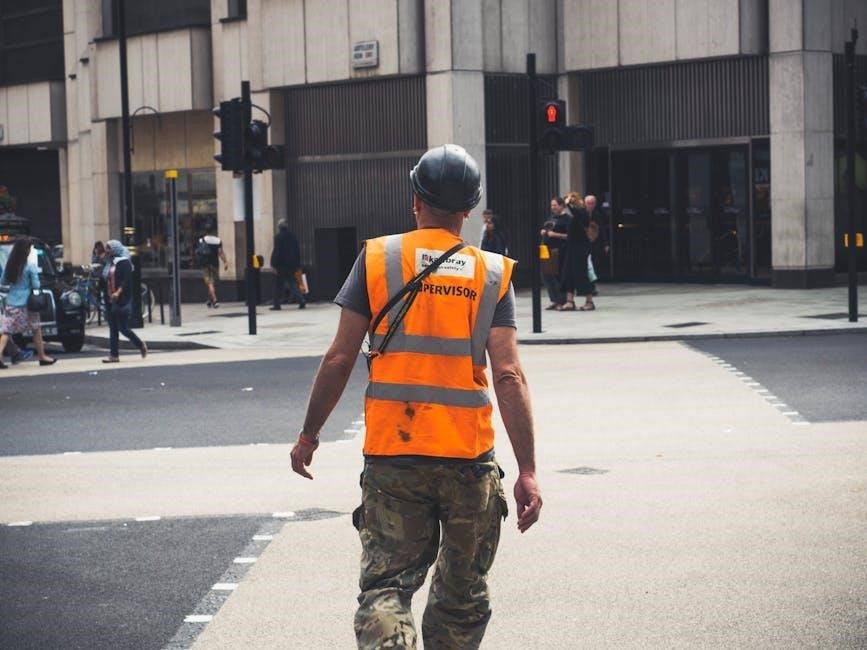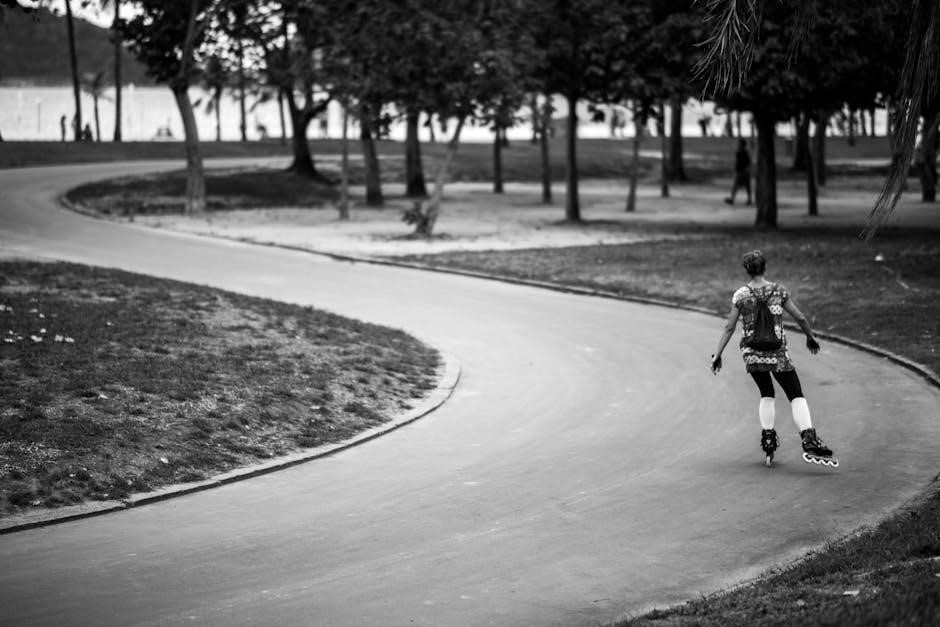the way of men pdf
Explore The Way of Men PDF‚ a straightforward guide to understanding masculinity‚ offering insights into historical male roles‚ tactical virtues‚ and the challenges men face today.
Overview of the Book
The Way of Men by Jack Donovan is a concise‚ impactful exploration of masculinity‚ challenging modern notions of manhood. Published in 2012‚ the book argues that masculinity is rooted in primal‚ evolutionary traits‚ emphasizing strength‚ loyalty‚ and brotherhood. Donovan critiques contemporary societal expectations‚ advocating for a return to traditional male roles. The text is divided into short‚ digestible chapters‚ making it accessible while maintaining depth. The 10th-anniversary edition includes additional essays‚ reinforcing its relevance. Part self-help‚ part philosophical inquiry‚ the book has become a cornerstone of the manosphere‚ sparking debates on gender roles and male identity in the modern world.
Author Background: Jack Donovan
Jack Donovan is a prominent American author‚ speaker‚ and independent thinker known for his work on masculinity and men’s issues. Born in 1974‚ Donovan gained recognition through his blog and self-published works. His 2012 book‚ The Way of Men‚ became a foundational text in the manosphere‚ advocating for a return to traditional masculine values like strength and brotherhood. Donovan’s writing often critiques modern society’s impact on male identity‚ emphasizing primal and evolutionary aspects of masculinity. His work has sparked significant debate‚ making him a controversial yet influential figure in discussions about gender roles and male culture.
Key Themes and Concepts
The Way of Men explores essential themes of masculinity‚ focusing on strength‚ brotherhood‚ and survival. Donovan argues that men are shaped by evolutionary instincts‚ emphasizing the importance of physical and mental resilience. The book critiques modern society’s devaluation of traditional masculine roles‚ advocating for a return to primal values. Key concepts include the “way of the gang‚” highlighting male camaraderie and shared purpose. Tactical virtues like loyalty‚ honor‚ and leadership are central‚ offering men a clear framework for self-improvement. By blending historical insight with practical advice‚ the book challenges men to embrace their natural roles in a world that often undermines them.

Understanding Masculinity
The Way of Men defines masculinity as a set of qualities developed through challenges‚ emphasizing strength‚ resilience‚ and purpose. It explores how societal expectations shape male roles‚ urging men to embrace their primal instincts and reject modern constraints that dilute traditional masculinity.
Definition and Evolution of Masculinity
In The Way of Men‚ masculinity is defined by qualities like strength‚ resilience‚ and loyalty‚ rooted in ancestral roles. The book traces masculinity’s evolution‚ from primal‚ tribal origins to modern complexities. Donovan argues that traditional masculine traits—once essential for survival—are now misunderstood. He critiques contemporary society for diluting these qualities‚ emphasizing that masculinity is not about dominance but about purpose and brotherhood. The text highlights how societal shifts have redefined male roles‚ often leaving men disconnected from their natural instincts. By exploring this evolution‚ the book aims to clarify what it means to be a man in a world that increasingly questions traditional masculinity.
The Role of Men in Society
The Way of Men explores the traditional role of men as protectors‚ providers‚ and leaders. Donovan argues that men’s roles are rooted in primal responsibilities‚ such as defending communities and ensuring survival. He emphasizes that men are wired to form brotherhoods‚ working together to achieve common goals. However‚ modern society often dismisses these roles‚ leading to confusion and disillusionment among men. The book asserts that men’s value lies in their ability to contribute meaningfully‚ whether through physical strength‚ strategic thinking‚ or loyalty. Donovan challenges men to reclaim their purpose in a world that increasingly devalues traditional masculine contributions‚ urging them to embrace their natural roles.
Challenges Men Face Today

The Way of Men highlights the modern challenges men encounter‚ such as over-regulation‚ political correctness‚ and shifting gender roles. Men today often feel disconnected from their primal instincts and traditional roles‚ leading to confusion and disillusionment; The book addresses the pressure to conform to evolving societal expectations while maintaining masculine identity. Donovan critiques the erosion of male spaces and the devaluation of physical strength in a increasingly civilized world. He also explores the mental and emotional toll of these changes‚ emphasizing the need for men to reclaim their sense of purpose and brotherhood in a society that often undermines their natural roles and instincts.
The Concept of the “Way of Men”
The Way of Men explores the idea of masculinity as a primal‚ collective identity rooted in strength‚ brotherhood‚ and the pursuit of survival‚ emphasizing men’s historical role as protectors and providers.
Historical Context of Male Roles
The concept of male roles is deeply rooted in history‚ where men were often seen as hunters‚ warriors‚ and providers. The Way of Men highlights how ancestral masculinity was shaped by survival instincts‚ physical strength‚ and the need to protect and lead. Historically‚ men formed groups or “gangs” to achieve common goals‚ fostering brotherhood and loyalty. These roles were essential for societal survival‚ with men often at the forefront of conflict and labor. The book emphasizes how these primal responsibilities defined masculinity‚ creating a foundation for understanding modern male identity and the challenges of adapting these roles in a changing world.
The Idea of Brotherhood and Gangs
The Way of Men explores the concept of brotherhood and gangs as essential to male identity. Historically‚ men formed groups to achieve common goals‚ fostering loyalty and camaraderie; These alliances‚ often forged in survival and conflict‚ became the cornerstone of masculine culture. Donovan argues that modern society has eroded such bonds‚ leaving men disconnected. The book advocates for reclaiming this primal sense of brotherhood‚ emphasizing shared purpose and mutual support. By understanding the historical significance of gangs‚ men can rebuild these connections‚ fostering resilience and strength in a fragmented world. This idea is central to Donovan’s vision of masculinity.
Physical and Mental Strength
In The Way of Men‚ physical and mental strength are cornerstone virtues. Donovan emphasizes that strength extends beyond muscle‚ encompassing resilience‚ courage‚ and the ability to endure adversity. Historically‚ men relied on physical prowess to protect‚ provide‚ and survive‚ fostering a culture of resilience. Mental fortitude is equally vital‚ enabling men to make tough decisions and remain steadfast under pressure. The book argues that modern society often undermines these qualities‚ leaving men unprepared for life’s challenges. By reclaiming physical and mental strength‚ men can rebuild their sense of purpose and mastery‚ aligning with their ancestral heritage and fostering a stronger‚ more capable masculinity.

Tactical Virtues for Men
Tactical virtues are essential qualities men must cultivate to thrive. These include physical strength‚ mental resilience‚ loyalty‚ honor‚ and leadership‚ enabling men to navigate life’s challenges effectively and build strong‚ capable individuals.
Importance of Physical Strength
In The Way of Men‚ physical strength is emphasized as a cornerstone of masculinity. It represents not just aesthetic appeal but the ability to protect‚ provide‚ and overcome challenges. Donovan argues that strength fosters resilience‚ confidence‚ and mental toughness‚ enabling men to thrive in adversarial environments. Historically‚ physical prowess was vital for survival‚ and its modern relevance remains undiminished. While contemporary society often downplays its importance‚ the book asserts that strength is a timeless virtue‚ empowering men to lead‚ safeguard others‚ and embody self-reliance. By cultivating physical power‚ men can reclaim their primal identity and embrace their role as protectors and pillars of strength.
Development of Mental Resilience
Mental resilience is a critical component of masculinity‚ as explored in The Way of Men. Donovan emphasizes the importance of cultivating a strong‚ unyielding mindset to navigate life’s challenges. Resilience is not just about enduring hardship but thriving despite adversity. It involves perseverance‚ determination‚ and the ability to remain focused on goals‚ even in the face of failure or setbacks. This mental fortitude is essential for men to lead‚ protect‚ and overcome obstacles in both personal and societal contexts.
By fostering resilience‚ men can embrace their roles as providers and defenders‚ embodying the strength needed to inspire others and maintain stability in uncertain times.
Significance of Loyalty and Honor
Loyalty and honor are cornerstone virtues in The Way of Men‚ essential for building trust and unity among men. Loyalty binds individuals together‚ fostering a sense of brotherhood and shared purpose. Honor serves as a moral compass‚ guiding actions and decisions to align with integrity and accountability. Donovan argues that without these principles‚ men lose direction and their collective strength diminishes. Loyalty and honor are not abstract concepts but actionable values that define a man’s character and his commitment to others. They are the foundation upon which men can stand together‚ face challenges‚ and earn respect in their communities.
Leadership and Decision-Making
Leadership and decision-making are critical components of masculine identity‚ as explored in The Way of Men. Effective leadership requires confidence‚ clarity‚ and the ability to guide others with authority. Decision-making‚ Donovan argues‚ should be bold and action-oriented‚ avoiding indecision. A man must take responsibility for his choices and be accountable for their outcomes. Leadership is not about dominance but about inspiring others to work toward a common goal. Strong decision-making fosters trust and respect‚ enabling men to lead effectively in both personal and collective endeavors. These qualities are essential for men to thrive in challenging environments and to fulfill their roles as leaders.

Modern Challenges and Criticisms
Modern society presents challenges like over-regulation and shifting gender roles‚ while criticisms argue the book overlooks progressive values and promotes outdated norms.
Over-Regulation and Political Correctness
Modern society’s emphasis on over-regulation and political correctness is seen as a significant challenge to traditional masculinity. The Way of Men critiques how these forces stifle men’s natural instincts and restrict their ability to embrace their roles. The book argues that excessive regulation creates a culture where men feel stifled‚ unable to express their masculinity without fear of judgment or repercussions. This shift has led to a sense of disorientation among men‚ who struggle to navigate a world where their traditional roles are increasingly marginalized. Donovan asserts that this over-regulation undermines male identity and fosters resentment‚ urging men to reclaim their inherent strengths.
Changing Gender Roles and Expectations
The shifting landscape of gender roles has left many men questioning their place in society. The Way of Men addresses how traditional masculine roles‚ such as provider and protector‚ are increasingly challenged by modern expectations. The book highlights the tension between embracing change and preserving core aspects of masculinity. Donovan argues that men are often caught between outdated societal norms and the pressure to adopt more emotionally expressive‚ nurturing roles. This confusion has led to a crisis of identity for many men‚ who struggle to reconcile their instincts with the evolving demands of modern life. The book encourages men to adapt while remaining true to their natural inclinations.
Criticism of Traditional Masculinity
The Way of Men delves into the growing criticism of traditional masculinity‚ often labeled as outdated or toxic. Critics argue that rigid gender roles suppress emotional expression and perpetuate inequality. Donovan acknowledges these concerns but counters by emphasizing the importance of maintaining certain timeless masculine traits. The book critiques modern societal pressures that discourage men from embracing their natural instincts‚ such as competitiveness and assertiveness. It argues that rejecting these traits entirely can lead to confusion and dissatisfaction. While the book defends traditional masculinity‚ it also encourages men to evolve and adapt to changing societal expectations without losing their core identity. This balance is central to its message.
Reception and Reviews
The Way of Men has sparked both praise and criticism. Fans applaud its clarity on masculinity‚ while critics argue it dismisses modern progress in gender equality and inclusivity.
Positive Feedback and Support
The Way of Men has been praised for its clear‚ straightforward approach to defining masculinity. Many readers appreciate its focus on tactical virtues like strength‚ loyalty‚ and leadership‚ finding it empowering and relevant. The book resonates with men seeking clarity in a complex‚ modern world‚ offering a raw‚ unfiltered perspective that challenges societal norms. Supporters argue it fills a void by addressing primal aspects of masculinity often overlooked in contemporary discourse. Its emphasis on brotherhood and resilience has struck a chord‚ making it a valued resource for those exploring traditional male roles and values in today’s changing landscape.
Negative Criticisms and Controversies
The Way of Men has faced criticism for its perceived promotion of toxic masculinity and glorification of violence. Some argue the book oversimplifies complex gender issues‚ dismissing modern progress in equality. Critics claim it reinforces harmful stereotypes‚ encouraging men to adopt regressive‚ aggressive behaviors. Additionally‚ Donovan’s association with controversial ideologies has sparked debate. The book’s focus on physical strength and dominance is seen as exclusionary‚ neglecting emotional and intellectual aspects of masculinity. Detractors also criticize its lack of nuance in addressing societal changes‚ labeling it as overly nostalgic for a bygone era. These criticisms highlight the polarizing nature of the text.

Impact on the Manosphere Movement
The Way of Men has significantly influenced the manosphere movement‚ resonating with those seeking a return to traditional masculine values. Its emphasis on strength‚ loyalty‚ and brotherhood aligns with the movement’s focus on redefining modern masculinity; The book has inspired countless discussions and debates within online communities‚ becoming a cornerstone of the movement’s ideology. Critics argue it has fueled divisive rhetoric‚ while supporters praise its unapologetic approach to male identity. Love it or hate it‚ The Way of Men has undeniably shaped conversations about masculinity‚ offering a provocative blueprint for men navigating contemporary societal expectations. Its influence continues to grow‚ polarizing opinions but sparking essential dialogue;

Comparisons with Other Literature
The Way of Men PDF stands out among self-help and manosphere literature‚ offering a unique blend of historical insight and practical advice on masculinity and brotherhood.
Similar Themes in Self-Help Books
While The Way of Men PDF offers a unique perspective on masculinity‚ its themes of self-improvement‚ resilience‚ and brotherhood align with broader self-help literature; Many self-help books focus on personal growth‚ discipline‚ and overcoming adversity‚ which are central to Donovan’s teachings. The emphasis on physical and mental strength echoes motivational guides like Atomic Habits or The 4-Hour Work Week. However‚ Donovan’s approach is distinct in its focus on primal masculinity and the importance of male camaraderie. His ideas resonate with readers seeking clarity on traditional masculine roles in a modern context‚ making The Way of Men a standout in the self-help genre.
Contrasting Views on Masculinity
While The Way of Men PDF emphasizes primal masculinity and brotherhood‚ other authors and self-help books present contrasting views. Some argue for a more emotionally expressive and adaptable form of masculinity‚ focusing on vulnerability and modern societal expectations. For instance‚ authors like David Deida or Ryan Holiday explore masculinity through emotional intelligence and philosophical introspection‚ differing from Donovan’s focus on physical strength and historical male roles. These contrasting perspectives highlight the diversity of thought on masculinity‚ offering readers varied approaches to understanding and embodying manhood in the modern world.
Unique Contributions of “The Way of Men”
The Way of Men stands out for its unfiltered‚ pragmatic approach to masculinity‚ avoiding religious or political entanglements. Jack Donovan offers a clear‚ actionable framework centered on tactical virtues like strength‚ loyalty‚ and leadership. Unlike many self-help books‚ it emphasizes brotherhood and historical male roles‚ drawing from ancestral patterns rather than modern societal trends. Donovan’s focus on the primal essence of masculinity‚ unapologetically rooted in physical and mental resilience‚ provides a distinct perspective. His rejection of over-civilized norms resonates with men seeking a grounded understanding of manhood‚ making it a refreshingly direct guide in a crowded field of self-help literature.
Cultural and Historical Context
Explores historical male roles‚ tracing masculinity’s roots in ancestral traditions and cultural variations‚ examining how these roles shape modern interpretations of manhood and societal expectations.
Historical Examples of Male Dominance
Historical examples of male dominance highlight the evolutionary roots of masculinity‚ emphasizing tribal hierarchies and warrior cultures. In ancient societies‚ men often held roles as protectors and providers‚ shaping societal structures. The Way of Men draws parallels to early human history‚ where strength and leadership were essential for survival. Historical contexts‚ such as Roman legions or Viking clans‚ illustrate how male-dominated groups thrived through camaraderie and shared purpose. These examples underscore the book’s argument that masculinity is deeply tied to primal instincts and collective action‚ reinforcing the idea that men have historically been driven by a need to prove themselves in challenging environments.
Cultural Variations in Masculinity

Masculinity varies significantly across cultures‚ reflecting diverse societal norms and expectations. In The Way of Men‚ Jack Donovan explores how different cultures have shaped male roles‚ from the stoicism of Nordic warriors to the honor-based systems of samurai. These variations highlight the adaptability of masculinity‚ tailored to the unique challenges of each society. For example‚ some cultures emphasize individual strength‚ while others prioritize collective loyalty and brotherhood. These differences underscore the idea that masculinity is not a fixed concept but a dynamic force shaped by historical‚ social‚ and environmental factors‚ offering insights into the universal and unique aspects of male identity.
Modern Interpretations of Traditional Roles
Modern interpretations of traditional male roles emphasize adaptability and redefined expectations. In The Way of Men‚ Jack Donovan discusses how men navigate evolving societal norms while maintaining core masculine traits. Contemporary interpretations focus on blending strength with emotional intelligence‚ fostering leadership without dominance‚ and embracing community roles. Men are encouraged to adapt traditional virtues to modern challenges‚ such as balancing career and family or contributing to societal progress. These interpretations highlight the need for men to redefine their roles actively‚ ensuring relevance in a changing world while preserving the essence of masculinity rooted in resilience‚ loyalty‚ and honor.
The Way of Men PDF concludes with a call to embrace traditional masculine virtues‚ adapt to modern challenges‚ and foster resilience and brotherhood in a changing world.
The Way of Men PDF explores the essence of masculinity‚ emphasizing physical and mental strength‚ loyalty‚ and honor. It critiques modern society’s over-regulation and shifting gender roles‚ advocating for a return to traditional masculine virtues. The book highlights the importance of brotherhood and historical male roles‚ urging men to embrace resilience and leadership. By blending philosophy and practical advice‚ it challenges men to navigate contemporary challenges while staying true to timeless principles. The text serves as a guide for understanding masculinity’s evolution and its relevance in today’s world‚ offering a clear path for men seeking clarity and purpose.
Final Reflections on Masculinity Today
The Way of Men PDF prompts readers to reflect on masculinity’s current state‚ emphasizing the need for men to embrace traditional virtues amidst modern challenges. The book highlights the tension between societal expectations and the timeless qualities of strength‚ resilience‚ and brotherhood. It critiques the erosion of male roles in an increasingly regulated world‚ urging men to reclaim their identity and leadership. By exploring historical contexts and contemporary struggles‚ the text encourages men to navigate the complexities of modern life while staying rooted in their natural inclinations. Ultimately‚ it challenges men to redefine masculinity on their own terms‚ fostering a sense of purpose and direction in uncertain times.
Call to Action for Men
The Way of Men PDF concludes with a powerful call to action‚ urging men to reclaim their identity and embrace the timeless virtues of masculinity. It encourages men to step away from societal expectations and redefine what it means to be a man in the modern world. By focusing on strength‚ loyalty‚ and leadership‚ men can rebuild a sense of purpose and belonging. The book inspires readers to form brotherhoods and take charge of their lives‚ fostering resilience and determination. Ultimately‚ it challenges men to act decisively‚ embracing their natural roles and creating a path forward that honors the essence of masculinity.

